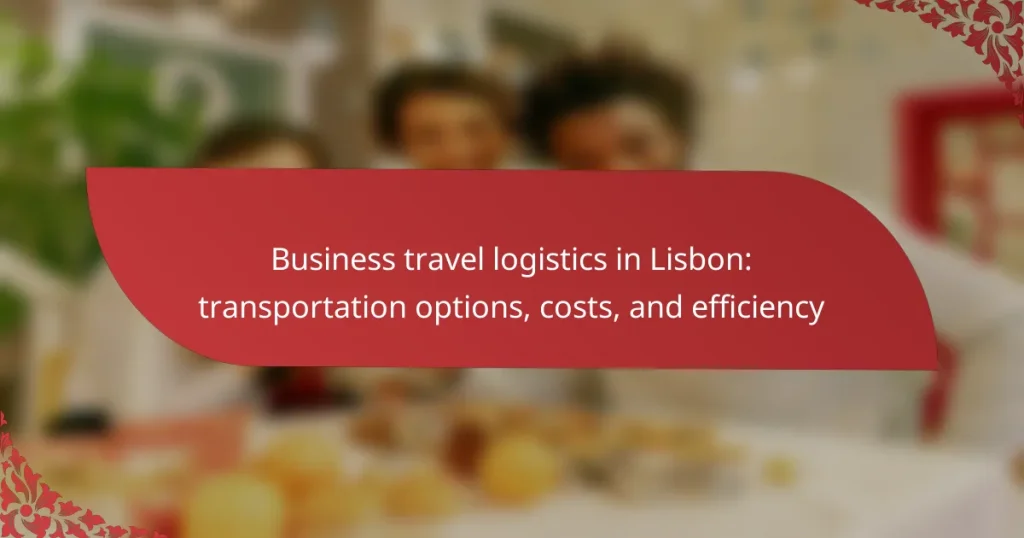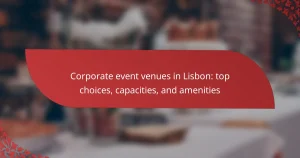Efficient transportation is crucial for business travelers in Lisbon, where navigating logistics can pose challenges. Explore various options like public transit, taxis, and ride-sharing services. Understand the associated costs and factors affecting efficiency, such as traffic and peak hours. Optimize your travel experience by leveraging the city’s comprehensive transport network.
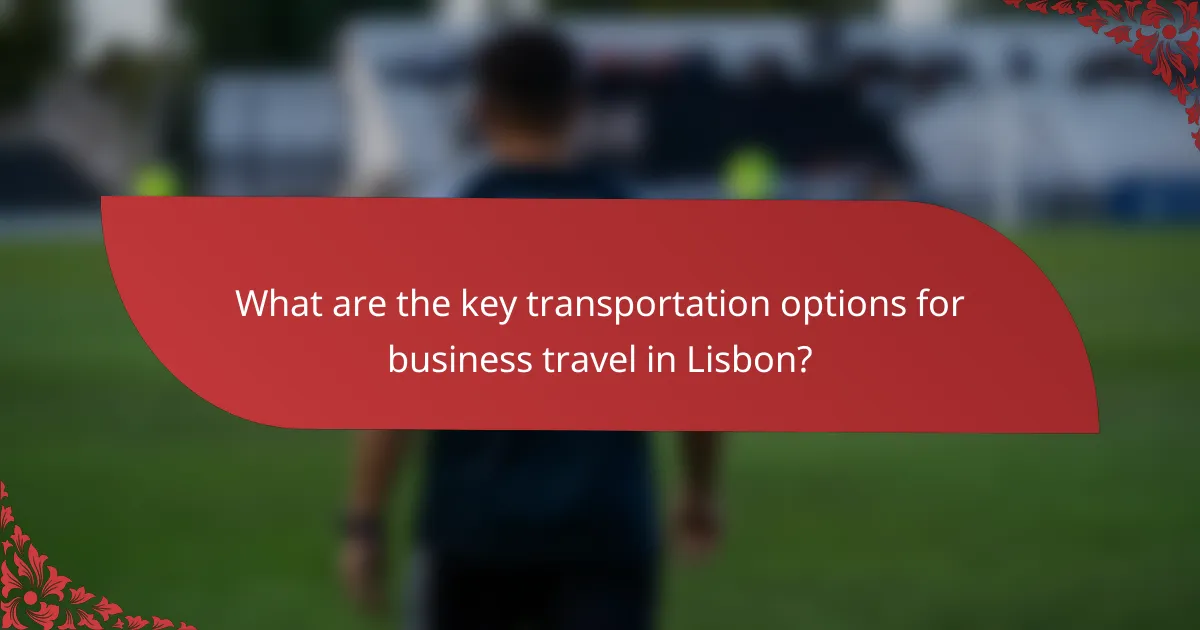
What are the key transportation options for business travel in Lisbon?
Lisbon offers various efficient transportation options for business travel, including taxis, public transit, and ride-sharing services. Taxis provide convenience with fares averaging €10-€20 for central destinations. Public transit, featuring metro, trams, and buses, costs around €1.50 per trip, ideal for budget-conscious travelers. Ride-sharing apps like Uber are also popular, with costs similar to taxis. Each option presents unique advantages in terms of cost, accessibility, and speed, catering to diverse business needs.
How do public transport systems support business travelers?
Public transport systems in Lisbon significantly enhance business travel by offering efficient, cost-effective transportation options. The city features a well-connected network of buses, trams, and metro services, facilitating quick access to key business districts.
Costs for public transport are relatively low, with a single ticket priced around €1.50, and options like the Lisboa Card provide unlimited travel for a set duration, promoting convenience for frequent travelers.
The efficiency of Lisbon’s transport system is evident through its punctuality and frequency, with metro trains running every few minutes during peak hours. This reliability ensures that business travelers can plan their schedules effectively, minimizing delays.
Additionally, the integration of real-time tracking apps allows users to monitor transport schedules, further enhancing the travel experience. Overall, Lisbon’s public transport supports business travelers by providing accessible, affordable, and timely options for navigating the city.
What role do taxis and ride-sharing services play in the logistics?
Taxis and ride-sharing services enhance logistics in Lisbon by providing flexible, on-demand transportation. They offer cost-effective and efficient options for business travelers, reducing wait times and improving overall travel experience.
Taxis typically have a base fare of around €3.50, with additional charges per kilometer. Ride-sharing services like Uber provide competitive pricing, often starting lower than traditional taxis. Both options allow for easy access to various locations, crucial for time-sensitive business meetings.
The integration of technology in ride-sharing apps facilitates real-time tracking and fare estimation, enhancing efficiency. Taxis, while traditional, are regulated and provide a reliable choice with established routes.
In summary, both transportation options play a vital role in optimizing business travel logistics in Lisbon, balancing cost, convenience, and efficiency.
Which private transportation services are available for corporate needs?
Private transportation services for corporate needs in Lisbon include executive car services, shuttle buses, and ride-hailing apps. These options cater to various group sizes and budgets, ensuring efficient travel. Executive car services offer luxury vehicles with professional drivers, ideal for high-level meetings. Shuttle buses provide cost-effective transport for larger groups, often used for events or conferences. Ride-hailing apps offer flexibility and convenience for on-demand travel. Each option varies in cost and efficiency, allowing businesses to choose based on their specific requirements.
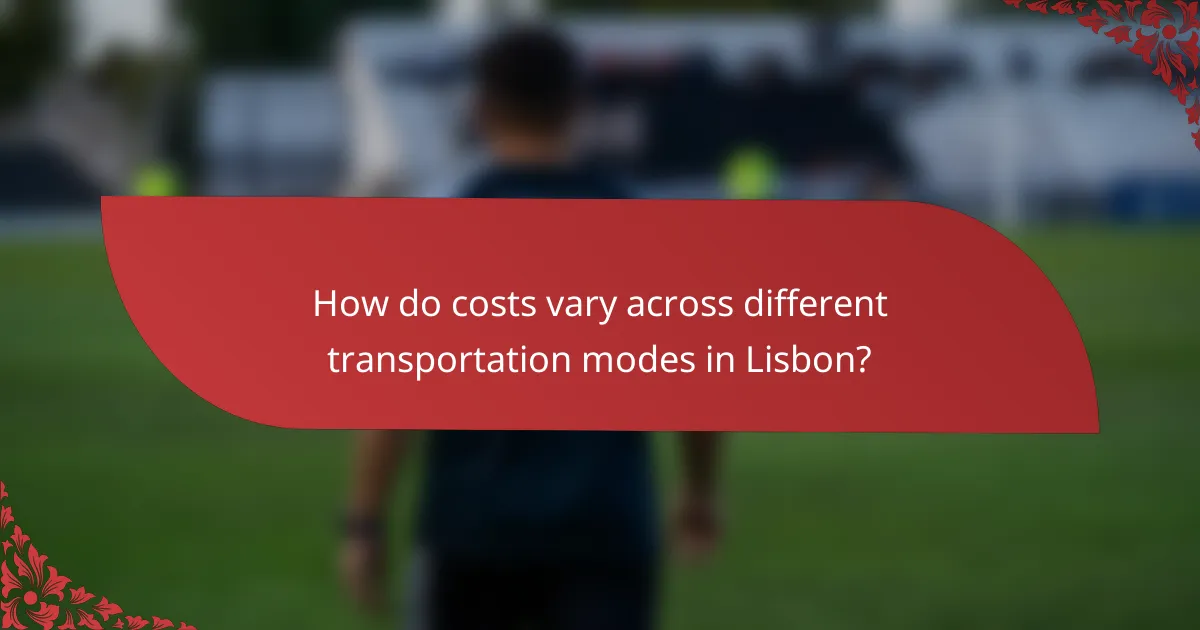
How do costs vary across different transportation modes in Lisbon?
Costs vary significantly across transportation modes in Lisbon, influenced by factors such as distance, convenience, and service type.
Public transport options like buses and trams are generally cost-effective, with fares around €1.50 per trip. Taxis have a base fare of approximately €3.50, increasing with distance, while ride-sharing services typically start at €5. Private car rentals can range from €30 to €70 per day, depending on the vehicle type and rental duration.
For business travelers, efficiency may also impact costs. Public transport is usually faster during peak hours, while taxis and ride-sharing may incur additional charges due to traffic.
What are the average fares for taxis and ride-sharing options?
Taxi fares in Lisbon typically start at around €3.50, with additional costs based on distance and time. Ride-sharing options like Uber have base fares starting at approximately €5, varying by demand and location. Both options are efficient for business travel, but ride-sharing may offer more flexibility.
How do public transport costs compare for frequent travelers?
Public transport costs in Lisbon favour frequent travelers through discounted passes. Monthly passes cost around €42, while single tickets are €1.50 each. Frequent travelers save significantly with passes, especially if using transport daily. The efficiency of Lisbon’s public transport system enhances this value, providing extensive coverage and timely services.
What are the pricing structures for private car hires and shuttles?
Private car hires and shuttles in Lisbon typically follow hourly or flat-rate pricing structures. Hourly rates range from €30 to €60, while flat rates for airport transfers can vary between €25 and €50 depending on the distance and service level. Factors influencing costs include vehicle type, booking time, and additional services like meet-and-greet.
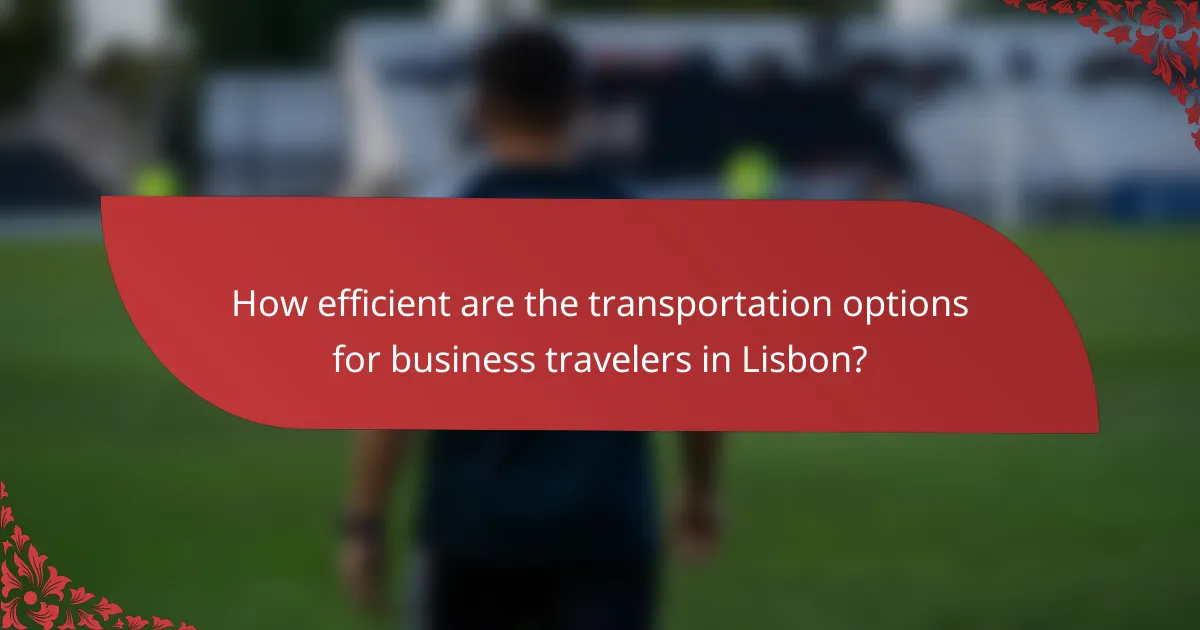
How efficient are the transportation options for business travelers in Lisbon?
Transportation options for business travelers in Lisbon are efficient and varied. The city offers several modes of transport, including metro, buses, trams, and taxis, ensuring quick access to key business areas. The Lisbon Metro is particularly efficient, with a network that covers major districts and operates frequently. Buses and trams complement the metro, providing extensive coverage. Taxis and rideshare services offer flexibility for direct routes. Costs for public transport are reasonable, with a single metro ticket priced around 1.50 EUR. Overall, Lisbon’s transportation system supports timely business travel, enhancing productivity for professionals.
What factors influence travel time across different modes of transport?
Travel time across different modes of transport is influenced by factors such as distance, traffic conditions, and mode-specific speed. In Lisbon, public transport options include buses, trams, and metro, which can vary in efficiency based on peak hours. Costs also play a role; for instance, taxis may offer quicker travel but at a higher price. Unique attributes like the availability of bike-sharing programs can further impact travel time by providing alternative routes.
How does traffic impact transportation efficiency during peak hours?
Traffic significantly reduces transportation efficiency in Lisbon during peak hours. Congestion leads to longer travel times, increased costs, and limited options for business travelers. The average speed during rush hours can drop to as low as 10 km/h, causing delays in appointments and meetings. Utilizing alternative routes or off-peak travel can enhance efficiency, but many businesses struggle to adapt to the unpredictable traffic patterns.
Which transportation options provide the most reliable schedules for business meetings?
Public transportation, taxis, and ride-sharing services in Lisbon offer reliable schedules for business meetings. Public transport, particularly the metro, operates on a fixed timetable, ensuring punctuality. Taxis provide flexibility and can be booked in advance, while ride-sharing apps guarantee quick access to vehicles. Consider peak traffic hours to enhance efficiency.

What unique features do Lisbon’s transportation options offer for business travelers?
Lisbon’s transportation options offer business travelers convenience, affordability, and efficiency. The city features a comprehensive public transport system, including metro, trams, and buses, which connect key business districts.
Unique attributes include the accessibility of the Lisbon Metro, which operates frequently and covers extensive areas, reducing travel time. Additionally, the city’s ride-sharing services provide flexible and cost-effective alternatives for quick transfers.
Business travelers can expect average costs of around 1.50 EUR for a metro ticket and competitive rates for taxis and rideshares. The integrated transport network enhances overall travel efficiency, making it easier to navigate meetings and events.
Lisbon’s transportation infrastructure is designed to support business needs, ensuring timely arrivals and seamless connections across the city.
How do accessibility features enhance the experience for travelers with disabilities?
Accessibility features significantly enhance the travel experience for individuals with disabilities by improving mobility and independence. In Lisbon, accessible transportation options include wheelchair-friendly buses and taxis, which facilitate easy navigation. Costs for these services can vary, but many public transport options offer discounts for travelers with disabilities. Efficiency is increased as these features often reduce wait times and streamline travel routes. Overall, accessibility features empower travelers with disabilities to explore Lisbon with greater ease and comfort.
What technological advancements are being integrated into transportation services?
Technological advancements in transportation services include electric vehicles, smart traffic management systems, and mobile apps for ride-hailing. These innovations enhance efficiency and reduce costs in business travel logistics in Lisbon. Electric vehicles lower emissions and fuel costs, while smart traffic systems optimize routes and minimize delays. Mobile apps streamline booking and payment processes, improving user experience. As a result, these technologies contribute to a more efficient and sustainable transportation ecosystem.

What are the common challenges faced by business travelers in Lisbon?
Business travelers in Lisbon commonly face challenges related to transportation efficiency, costs, and availability. Navigating the city’s public transport system can be complex, with limited options during off-peak hours. The cost of taxis and ride-sharing services can add up quickly, impacting budgets. Additionally, traffic congestion during peak hours can lead to delays, affecting meeting schedules. Finding reliable transportation that balances cost and time efficiency remains a key concern for business travelers.
How do language barriers affect transportation logistics?
Language barriers can significantly hinder transportation logistics in Lisbon by causing miscommunication and delays. In business travel, clear communication is crucial for coordinating schedules, routes, and accommodations. Misunderstandings due to language differences can lead to inefficient routing, increased costs, and missed connections.
For example, if a transportation provider misunderstands a client’s destination or specific requirements, it can result in longer travel times and higher expenses. Additionally, language barriers may limit access to local transportation options, reducing overall efficiency.
To mitigate these challenges, businesses can employ multilingual staff or use translation services, ensuring smoother logistics and improved travel experiences. This proactive approach can enhance communication and optimize transportation logistics in Lisbon.
What are the safety concerns that business travelers should be aware of?
Business travelers should be aware of various safety concerns, including theft, transportation reliability, and health risks. Lisbon has a relatively low crime rate, but petty theft can occur, especially in crowded areas. Use reputable transportation services to ensure efficiency and safety. Public transport is generally safe, but remain vigilant. Health risks may arise from local food and water; consider bottled water and reputable dining options.

What best practices can optimize business travel logistics in Lisbon?
To optimize business travel logistics in Lisbon, focus on efficient transportation options, cost management, and streamlined processes. Utilize public transport like the metro and trams for cost-effective travel. Taxis and ridesharing services offer flexibility but can be pricier. Booking transportation in advance can save time and reduce costs. Consider proximity to business venues when selecting accommodations to enhance overall efficiency.
How can travelers effectively plan their transportation in advance?
Travelers can effectively plan transportation in Lisbon by researching options, estimating costs, and considering efficiency. Public transport includes metro, trams, and buses, offering affordable fares around €1.50 per trip. Taxis and rideshare services like Uber are available but can be pricier, averaging €10-€20 for common routes. Renting a car is another option, with costs ranging from €30-€60 per day, plus parking fees. Planning routes using apps can enhance efficiency, ensuring timely arrivals for business engagements.
What tips can improve the overall efficiency of business travel in Lisbon?
Utilizing efficient transportation options and planning can significantly enhance business travel in Lisbon. Prioritize using the metro for quick access to key areas, as it is cost-effective and avoids traffic. Consider ride-sharing services for convenience and flexibility, especially for meetings. Booking accommodations near business districts reduces travel time. Additionally, schedule meetings during off-peak hours to minimize delays. Lastly, leverage local resources, such as travel apps, for real-time updates on transportation and traffic conditions.
